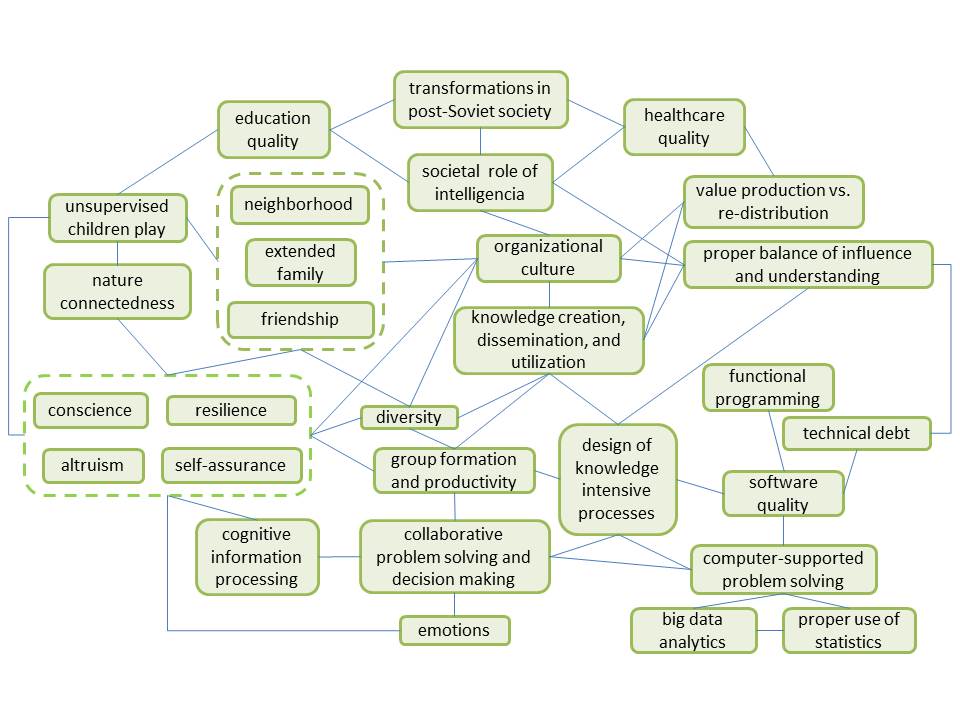
CURRENT INTEREST MAP, JUNE 2015.
Interest Map.

CURRENT INTEREST MAP, JUNE 2015.
Interest Map shows topics I am interested in and their interconnections.
They can be summarized by one general question: "How to create a world where individual abilities, and ability to think first of all, can develop to their fullest potential and will be utilized for common good?" The world consists of societies, societies of organizations and institutions, organizations and institutions of teams, and teams of individuals. Thus my interests span all these levels and will expand when humankind gets in touch with other intelligent life existing in the universe, or when we start to deal with computers as with humans. Sure, the above map is limited by my experience.
I will gladly dig in at any location on the map, if favorable conditions emerge. Yet at this moment I am most interested in four groups of questions naturally arising from the four practical interrelated endeavors of mine:
In the course of researching co-acting groups in industry and academia, I became more and more concerned that teams, intentionally or not, often were used to replace best individual thinkers: even when that should be less productive than involving outstanding individuals in collaborative problem solving. In my thesis I studied why exceptionally analytic people did not perform well in a team, and what could be done to integrate them into collaborative problem solving.
While bringing up my children and doing research in educational institutions, I could not stop asking myself why even elite private schools and universities have quite disappointing results preparing capable thinkers, who are good at collaborating with others? Interestingly enough, the most profound causes of that seem to be outside of the area of instructional technologies or educational policies. Addressing the three following questions looks to me as most promising:
Finally, most of us will agree, that impact of intelligence and rationality is declining with increasing size of an organization. This phenomenon, which is well known as “becoming a big company” is considered as inescapable as laws of gravity. Yet after working both in some of the best companies in Silicon Valley and in a variety of others, all of which have succumbed to “becoming a big company,” I still see an opportunity to avoid this common fate by starting to pay closer attention to the problem-solving and decision-making processes and asking questions like:
My methodological interests stem from my preference for action research exemplified in work of Kurt Lewin and Brunno Bettelheim, which was continued and recently described by Chris Argyris (1985) and Edgar Schein (1987, 1988). Personally, I find that at the present stage of development of social sciences their theoretical foundation is not strong enough to direct my research or to evaluate its quality. For this reason in my studies I need a close link with practically important tasks.
I have searched through many approaches to examination of social phenomena which seemed well positioned for meaningful mathematical modeling. System dynamics approach (Morecroft and Sterman 1994) to problem solving in small groups seems most promising to me so far.
References
Argyris, Chris, Robert Putnam, and Diana Smith. 1985. Action Science : Concepts, Methods, and Skills for Research and Intervention San Francisco, CA : Jossey-Bass
Morecroft, John and John Sterman. 1994. Modeling for Learning Organizations Portland, OR: Productivity Press
Schein, Edgar. 1987. Process consultation. Vol. 2 Reading, MA: Addison-Wesley
Schein, Edgar. 1988. Process consultation. Vol. 1 (Revised edition) Reading, MA: Addison-Wesley